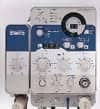The researchers of a recent phase II study set out to assess the activity and safety of moxifloxacin in the initial stage of tuberculosis (TB) treatment, finding that the antibiotic is active against TB and could potentially shorten the duration of treatment for the disease by several months.
The researchers conducted a controlled trial of a regimen that included moxifloxacin in adults with sputum-smear-positive tuberculosis at a hospital in Rio de Janeiro, Brazil.
During the study, 170 participants received isoniazid, rifampicin, and pyrazinamide at standard doses and were assigned to receive either moxifloxacin (400 mg) with a placebo, or ethambutol plus moxifloxacin placebo 5 days per week for 8 weeks. The primary endpoint was the proportion of patients whose sputum culture had converted to negative by week 8. The researchers excluded patients whose baseline cultures were negative, contaminated, or contained drug-resistant Mycobacterium tuberculosis. Additionally, all missing 8-week results were deemed treatment failures.
At the end of 8 weeks, culture conversion to negative had occurred in 59 (80%) of 74 patients in the moxifloxacin group compared with 45 (63%) of 72 in the ethambutol group. There were 16 adverse events (eight in each group) in 12 patients. Only one event was judged related to study drug.
The study is published in The Lancet as part of the feature, “Targeting Tuberculosis.” The feature also includes an editorial highlighting the changing epidemiology of tuberculosis and how it warrants a scaling-up of control efforts worldwide.







